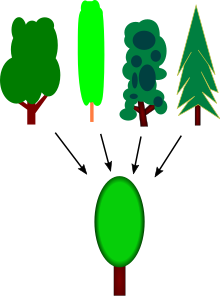
A concept is an abstract idea that serves as a foundation for more concrete principles, thoughts, and beliefs.[1] Concepts play an important role in all aspects of cognition.[2][3] As such, concepts are studied within such disciplines as linguistics, psychology, and philosophy, and these disciplines are interested in the logical and psychological structure of concepts, and how they are put together to form thoughts and sentences. The study of concepts has served as an important flagship of an emerging interdisciplinary approach, cognitive science.[4]
In contemporary philosophy, three understandings of a concept prevail:[5]
- mental representations, such that a concept is an entity that exists in the mind (a mental object)
- abilities peculiar to cognitive agents (mental states)
- Fregean senses, abstract objects rather than a mental object or a mental state
Concepts are classified into a hierarchy, higher levels of which are termed "superordinate" and lower levels termed "subordinate". Additionally, there is the "basic" or "middle" level at which people will most readily categorize a concept.[6] For example, a basic-level concept would be "chair", with its superordinate, "furniture", and its subordinate, "easy chair".
Concepts may be exact or inexact.[7] When the mind makes a generalization such as the concept of tree, it extracts similarities from numerous examples; the simplification enables higher-level thinking. A concept is instantiated (reified) by all of its actual or potential instances, whether these are things in the real world or other ideas.
Concepts are studied as components of human cognition in the cognitive science disciplines of linguistics, psychology, and philosophy, where an ongoing debate asks whether all cognition must occur through concepts. Concepts are regularly formalized in mathematics, computer science, databases and artificial intelligence. Examples of specific high-level conceptual classes in these fields include classes, schema or categories. In informal use, the word concept can refer to any idea.
- ^ Goguen, Joseph (2005). "What is a Concept?". Conceptual Structures: Common Semantics for Sharing Knowledge. Lecture Notes in Computer Science. Vol. 3596. pp. 52–77. doi:10.1007/11524564_4. ISBN 978-3-540-27783-5.
- ^ Chapter 1 of Laurence and Margolis' book called Concepts: Core Readings. ISBN 9780262631938
- ^ Carey, S. (1991). Knowledge Acquisition: Enrichment or Conceptual Change? In S. Carey and R. Gelman (Eds.), The Epigenesis of Mind: Essays on Biology and Cognition (pp. 257–291). Hillsdale, NJ: Lawrence Erlbaum Associates.
- ^ "Cognitive Science | Brain and Cognitive Sciences". Archived from the original on 2021-06-18. Retrieved 2019-07-08.
- ^ Eric Margolis; Stephen Lawrence. "Concepts". Stanford Encyclopedia of Philosophy. Metaphysics Research Lab at Stanford University. Retrieved 6 November 2012.
- ^ Eysenck. M. W., (2012) Fundamentals of Cognition (2nd) Psychology Taylor & Francis.
- ^ Joseph Goguen ""The logic of inexact concepts", Synthese 19 (3/4): 325–373 (1969).